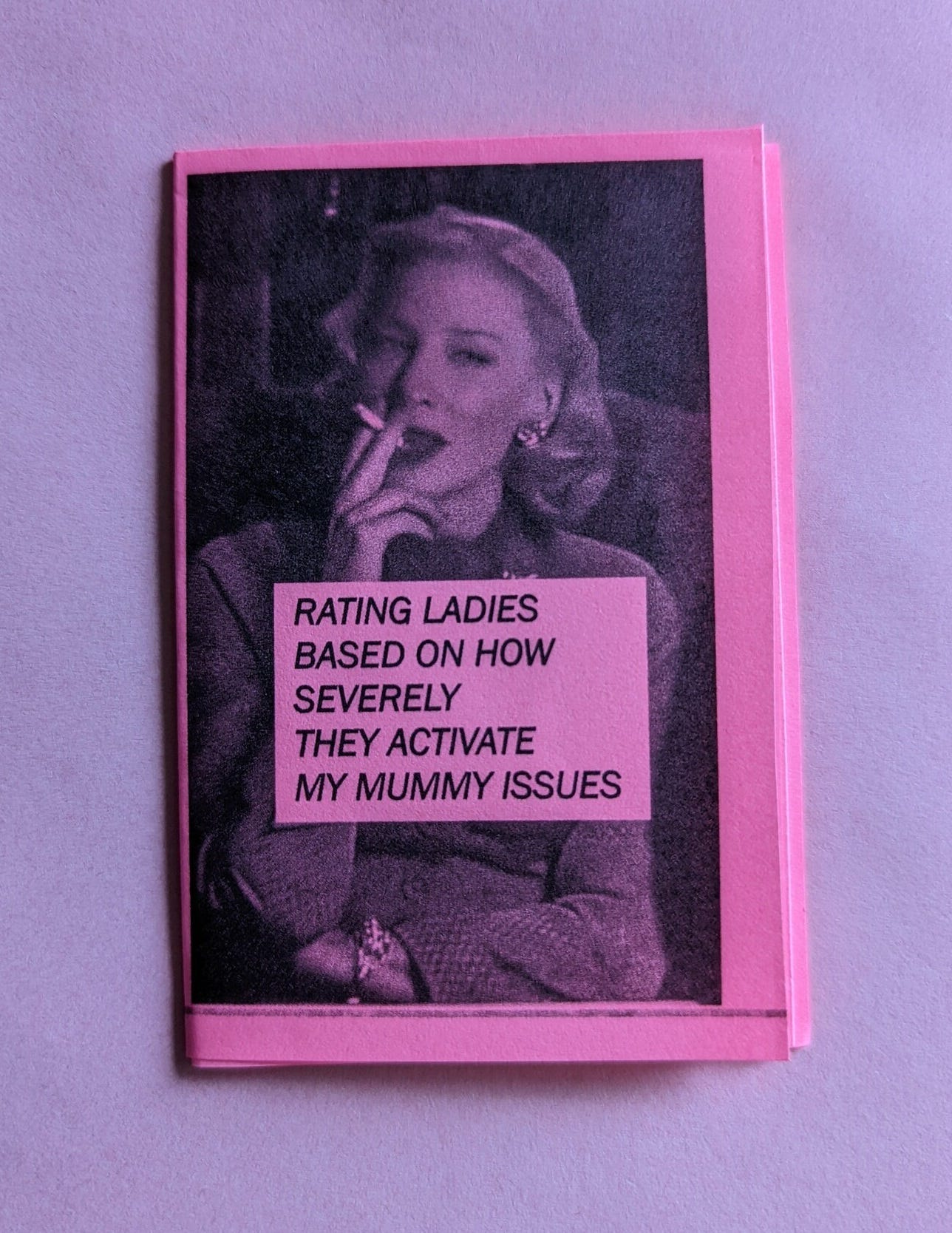Spotlight on: the Zine Community
Zines are a valuable means of self-expression and offer a platform for diverse and marginalised voices; I asked three zinesters what zines mean to them
Zines (pronounced ZEEN) are small, self-published publications typically produced by individuals or small groups. Zines sprung up early in the 20th century and have since served to platform personal expression, marginalised voices, niche topics, and non-mainstream perspectives (read more in-depth about zine history here). They often have a home-spun aesthetic and encompass a vast array of topics and styles. In the digital age, zines are increasingly digitally produced and/or sold.
I run a small zine press that currently distributes accessible digital and printable zines. Majority of my zines are about queer identity and pop culture. As a writer, my work is usually mostly serious, with moments of levity—as a silly billy, zines are my outlet for funnier (to me, anyway) content. I have a shop online. But I don’t make zines for money (I think I make about 4 dollars a month, just enough to cover costs)—I make them for the love of it.
So, what counts as a zine?
Many definitions of “zine” may not fit the mould of what you’re making, and vice versa.
If you spend even five minutes looking at zines online, you’re going to run into Bre’s content. Not only does she share her awesome creations, but she probably has one of the most comprehensive collections of accessible zine-making resources online. So, I figured she could answer this question. I reached out to Bre and asked her how she defines a zine, and she says,
“Zines mean accessibility, self-expression, and information. There are several ways to go about creating one, which I think everyone should explore and experiment with. If the work you’re putting out there in this format is easy to make, duplicate, and distribute then it’s a zine to me!”
So, now we know what a zine is, why should we make one? There are so many ways to interact with zines and the zine community. I asked these zinesters for their perspectives.
Loretta:
“… zines are an especially intimate medium. They're almost like notes or letters. That sense of intimacy has allowed me to be vulnerable, and express myself openly.”

Loretta is a self-professed ‘artist and zine baby’ making things on Wangal Country in Australia. Her shop boasts zines, prints, stickers, stationary and more. When I asked what zines mean to her, Loretta said,
“They mean so much to me! Zines have been a really important part of my creative practice and also a tool for finding community. Other zine makers have been so welcoming and have encouraged me to share my zines. Reading other people's zines has exposed me to new ideas and I love how they can be so many different things. I also love how accessible they are, both as a maker and a reader.”
Loretta also says that zine making has been a valuable means of self-expression:
“I have definitely made my most personal work in my zines. They've been a way to explore new mediums, such as poetry and comics. I've made zines about friendship and dating, self love, body neutrality, anxiety, and my own queerness. I think because they're small, sharable objects, zines are an especially intimate medium. They're almost like notes or letters. That sense of intimacy has allowed me to be vulnerable, and express myself openly.”
Helena:
“I got amazing texts from people who told me that my first queer zine moved them and that they felt seen.”

Helena is a creative from Germany who makes zines about queer empowerment, environmentalism, love of nature, and intersectional feminism. She also runs zine-making workshops in Berlin and Potsdam. When I asked what zines mean to her, Helena said,
“Zines are a great opportunity to be creative and to work analogue. It's so much fun to work with different materials and to not worry about perfection. I also educate myself and do research while working on a zine. For example, I learned a lot about snails and slugs while working on "Snails & Slugs and Why I think They're Underrated". Then I get to share that knowledge with other people and educate people about topics that matter to me. And I can learn a lot from other people's zines aswell.”
Helena also says that zines have connected her to the queer community:
“Since I started making zines, I engaged more with other queer people. I got amazing texts from people who told me that my first queer zine moved them and that they felt seen. Seeing that I could make other people feel more comfortable and understood through zines was so great and unexpected. Talking about queer topics in my zines and engaging with queer zinesters also made me more comfortable in my own queerness.”
You only need a piece of paper and a pen to get started
In an increasingly digital world that pressures us into perfection (or strategically relatable imperfection), zines offer escape. They fill the gaps left by mainstream media in showcasing diverse voices and identities. Whether a zine is basically a foldable shit-post (e.g. most of mine), a deep exploration of a social issue, or anything in between, zines are a medium in which our voices are valuable and our stories matter.
Don’t forget to check out Bre, Loretta’s website & Helena on Instagram and show them your support!






As a new zine-er this was lovely and informative to read.